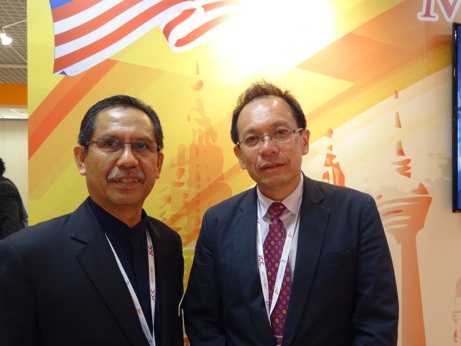
Abd. Khalid Maulod, Marketing & Promotion, FINAS (left); and Richard Ung Kok Kee, Board Member, FINAS (right)
Q: Firstly, what will be your broad objectives having FINAS here at MIPTV?
A: Broad objectives are to give our established Malaysian companies continuous support and also to create interests for the new companies, new producers who have got new products to get the industry excited. So that shows that in Malaysia, there’s a very robust industry going on. New companies continue to keep coming in with new ideas and the old ones are also becoming stronger and better. (FINAS is bringing over 40 Malaysian media entertainment companies to this year’s MIPTV.)
Q: FINAS has gone through some structural changes. How is FINAS different today as it was a year ago?
A: The objective of FINAS is still the same today. Number one is to promote as a regulator and number two to develop the industry. But lately, starting from this year, besides the Ministry of Information, Communication and Culture, there’s another unit called Film Negara. Film Negara is actually another unit that has been around in the Ministry that specifically focuses on production. So that unit is now defunct, and has been absorbed and merged into FINAS. In this instance, FINAS has become a bigger organisation. And also, the new parliament act allows FINAS to be a producer as well. So besides doing the job of regulating and development, now we are also producing our own content. We now have the capacity, ability and licence to produce. Film production, everyone knows – funding is a very important criteria. Many creative people have great ideas but when it comes to funding; it proves to be an obstacle. So with FINAS now in the position to act as a producer, we can at least spot and back up the new creative talents that come along. So these are the structural changes that we think will make the industry more exciting and robust.
Q: Speaking of funding, a year ago, FINAS made the announcement about the Film in Malaysia 30% tax rebate, meant to take effect in January. Could you give us an update?
A: We launched early this year and to date, put it this way, we have not approved any applications that have come in. We need to scrutinise the applications and from there we will give them a conditional certificate for them to start their productions, whereby they will fall under this incentive scheme. We have not approved any for the time being but we hope to go through this process and to be able to give some of these companies the certificate and start their productions. But again, in this business, there will be companies applying and sometimes, you may give them the certificate but they will just hold on to the certificates and may not want to begin shooting. So that will be an operational obstacle to us because you do not want to approve too many at one go. We will have to plan and monitor the situation. So this is the first time we are doing it and we will try to learn as far as possible.
Q: What criteria do you set in approving these applications?
A: For the time being, we welcome anybody from small productions to big productions. In terms of production budget, the minimum spend requirement is RM5 million and if it’s a local production it’s RM2.5 million. If you are doing only post-production, it’s RM 1.5million.
Q: Do we have a sense of how many applications have been received so far?
A: We’re unable to provide figures now but we understand from the unit that is handling the applications that the responses have been encouraging. We hope to start calling for interviews soon and get them going on their production process.
Q: Will you be represented next at Cannes Film Festival as well, as you were last year?
A: We will be at the Marché du Film, part of the Cannes Film Festival. We will be bringing a few companies involved in feature film production – more than 10 companies. But we are seriously trying to find a new approach towards coming to markets like these. We have to think hard and work hard to find a new way out. I think by just bringing the exhibitors, and just putting up posters and distributing flyers – this whole style of business – will have to be readdressed. You want to take a step further. After bringing our people to the market, the contacts that they built up, the customer base that they have; we’re going to have analysis and from there we go a step further. If our companies are say, doing a lot of business with the Middle East, then we think we need to bring a trade delegation to the Middle East to be near to our clients. So in this instance, our development or marketing budget will be more effective. Right now, 80% or 90% of our budget is being put into just attending trade shows. We may want to rejuggle the way we spend our money.
Q: Can you provide updates on the Kuala Lumpur Communications & Creative Industry Mart (KLCCIM)? It’s been postponed once – the industry will like to find out what has become of this event?
A: It has been postponed. I am sure everyone is aware of what our country is going through in this period – the elections. So once the new government comes into place, regardless of what FINAS entrusted to do this kind of industry development, we’ll put this paper to the new government and make them aware. From there on, we’ll move onto the next new best direction. There will be no resubmission of proposals for the event – the template and original motive still stays.
Q: Any upcoming projects or initiatives that you will like the industry to know about?
A: We just recently concluded Asian Side of the Doc, which ran parallel to the Hong Kong FILMART. We felt that was a huge success. In the sense that it opened up a new frontier to the people in our industry. I think people in the creative content industry generally think that making movies and dramas is their bread and butter. We on the FINAS and MDEC side, we also believe that animation has been a very exciting genre. So a lot of funding has been put into this area. We also believe that documentary is a very exciting area to look out for. And Asian Side of the Doc saw a few hundred documentary makers, buyers and broadcasters – there were 40 over broadcasters from worldwide attending the event. The event itself was five days and the training process added another week. It was almost like a two-week event and we spent quite some money. But we think our Malaysian producers have now found a new area to get themselves into. With that kind of interest generated for our Malaysian documentary producers, we will be able to get them to be more excited to do bigger things. That’s a great motivation to our other existing creative content producers – either drama or movie producers, who generally in our country are being spoonfed too much, if I may say, in the sense that they can easily get jobs with the broadcasters. If you see the quality of the pitches by international producers, it is just fantastic. That is something we will showcase to our own producers and tell them it is something they should and can learn from. It is eye-opening for them. But we also need to now go back and analyse whether all these efforts are bearing fruits or not.
Q: Finally, is the Pinewood Iskandar Studios on track to launching in May?
A: According to CEO Michael Lake, it is on track to launching in May. I just had a word with him this morning, he said at the upcoming Cannes Film Festival, he will be announcing the major projects.








